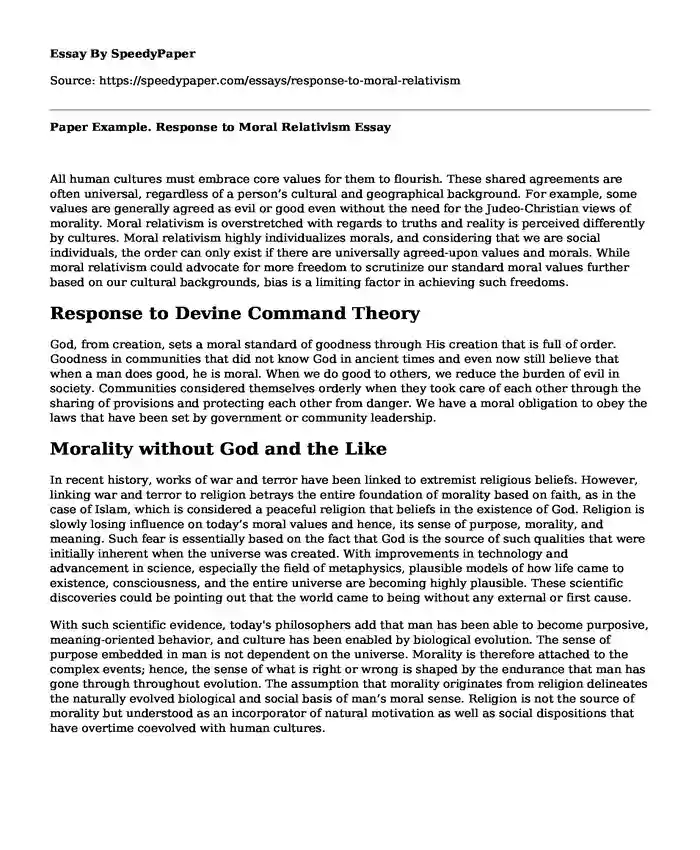
| Type of paper: | Essay |
| Categories: | Culture Religion Ethical dilemma |
| Pages: | 2 |
| Wordcount: | 483 words |
All human cultures must embrace core values for them to flourish. These shared agreements are often universal, regardless of a person’s cultural and geographical background. For example, some values are generally agreed as evil or good even without the need for the Judeo-Christian views of morality. Moral relativism is overstretched with regards to truths and reality is perceived differently by cultures. Moral relativism highly individualizes morals, and considering that we are social individuals, the order can only exist if there are universally agreed-upon values and morals. While moral relativism could advocate for more freedom to scrutinize our standard moral values further based on our cultural backgrounds, bias is a limiting factor in achieving such freedoms.
Response to Devine Command Theory
God, from creation, sets a moral standard of goodness through His creation that is full of order. Goodness in communities that did not know God in ancient times and even now still believe that when a man does good, he is moral. When we do good to others, we reduce the burden of evil in society. Communities considered themselves orderly when they took care of each other through the sharing of provisions and protecting each other from danger. We have a moral obligation to obey the laws that have been set by government or community leadership.
Morality without God and the Like
In recent history, works of war and terror have been linked to extremist religious beliefs. However, linking war and terror to religion betrays the entire foundation of morality based on faith, as in the case of Islam, which is considered a peaceful religion that beliefs in the existence of God. Religion is slowly losing influence on today’s moral values and hence, its sense of purpose, morality, and meaning. Such fear is essentially based on the fact that God is the source of such qualities that were initially inherent when the universe was created. With improvements in technology and advancement in science, especially the field of metaphysics, plausible models of how life came to existence, consciousness, and the entire universe are becoming highly plausible. These scientific discoveries could be pointing out that the world came to being without any external or first cause.
With such scientific evidence, today's philosophers add that man has been able to become purposive, meaning-oriented behavior, and culture has been enabled by biological evolution. The sense of purpose embedded in man is not dependent on the universe. Morality is therefore attached to the complex events; hence, the sense of what is right or wrong is shaped by the endurance that man has gone through throughout evolution. The assumption that morality originates from religion delineates the naturally evolved biological and social basis of man’s moral sense. Religion is not the source of morality but understood as an incorporator of natural motivation as well as social dispositions that have overtime coevolved with human cultures.
Cite this page
Paper Example. Response to Moral Relativism. (2023, Aug 27). Retrieved from https://speedypaper.com/essays/response-to-moral-relativism
Request Removal
If you are the original author of this essay and no longer wish to have it published on the SpeedyPaper website, please click below to request its removal:
- Philosophy Essay Example: Problem of Evil
- Christianity Essay Example
- Research Proposal Paper Sample: Ministering To a Post Church Society
- Free Essay Example - Head Lice
- Free Essay Sample. The Influence on the Position of Women
- Become a Clergy - Free Paper Example
- Christian Spirituality Perspective and Postmodern Relativism in Healthcare - Essay Sample
Popular categories




